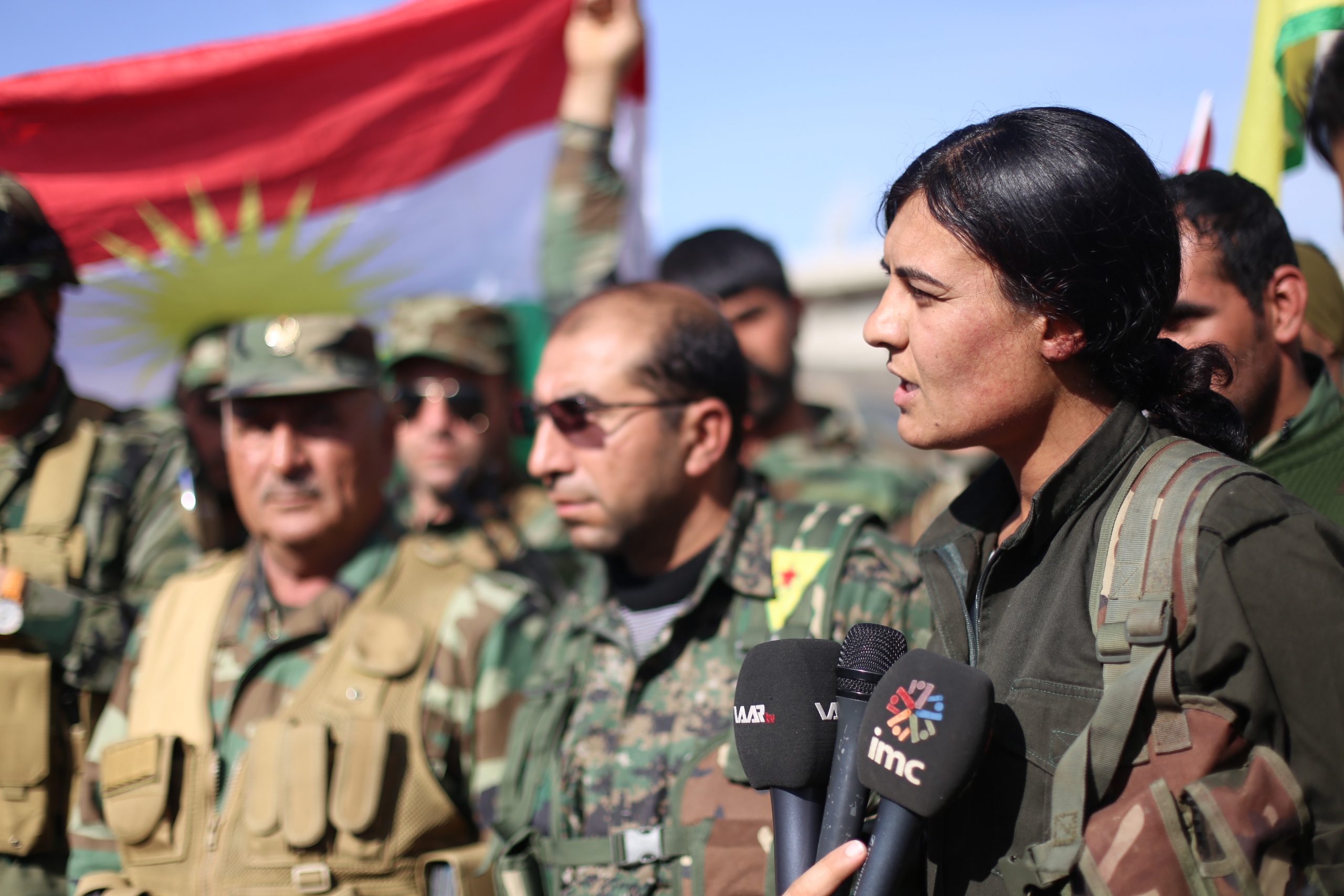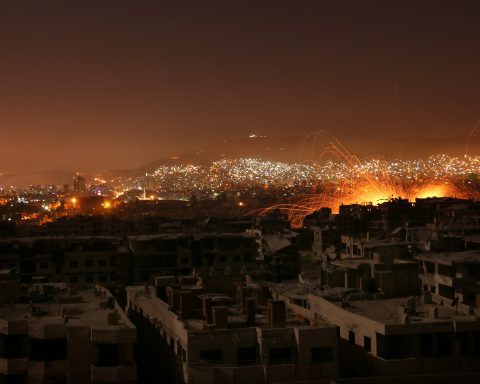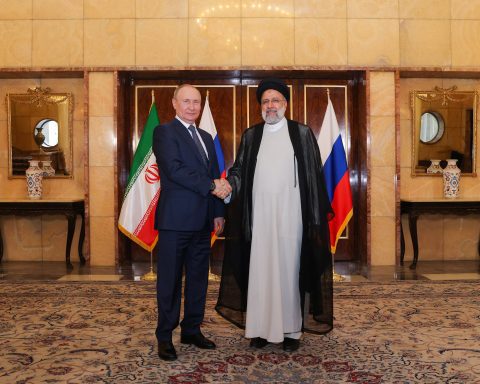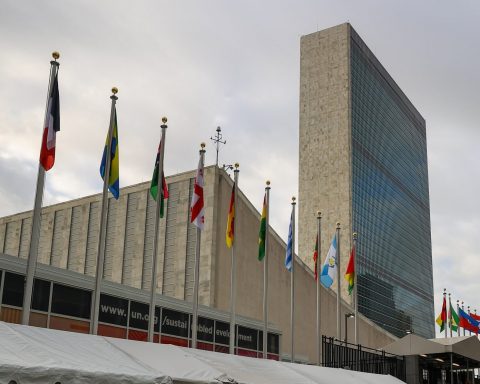The PKK-affiliated Syrian Kurdish Democratic Union Party (PYD) has been seeking worldwide political recognition and has opened several offices in the US, EU, and Russia.
On February 8, 2015, French President François Hollande hosted a meeting with Asya Abdullah, the PYD co-chair, and Nesrin Abdullah, the commander of the People’s Defence Units’ (YPG) female branch, the Women’s Protection Units (YPJ). They are diplomatically active in Brussels; home to NATO, the European Commission, and the European Parliament. They already have offices in Prague and Stockholm. “Copenhagen is next,” Fehmi Tastekin wrote on April 22, 2016, in Al-Monitor.
On February 10, 2016, a representative office in Moscow was opened, and on September 8, 2016, a new Benelux office of the so-called “Autonomous Administration of North and East Syria” was opened in the Netherlands by Joël Voordewind, an MP for the Dutch ChristenUnie.
Back to where it started
In 2012, the Assad regime handed over the areas to the PYD, the only Syrian Kurdish organization willing to coordinate with the Assad regime. Abdel Hakim al-Bashar, leader of KDP-S, the biggest party in what was to become the Kurdish National Council (KNC), was also approached by the regime, but refused.
The defected security director of Qamishli, Abdelbaset Abdellatief, told the author: “I got orders to hand over all police departments to the PYD, which we did. Amoude, Derbasiya, Al-Qahtaniya, al-Jawadiya, and Mirdaan. We even handed them over, including the brand-new weapons, plus the Toyota pick-ups, which we got only a month or a few months before.”
Although other Syrian Kurdish parties reject working with the PYD, several Western politicians promote it. The first does so because of the PYD’s collaboration with the Assad regime, and their repressive nature. Furthermore, in the areas under PYD/YPG control in northeastern Syria, the majority are Arabs. They don’t care much for the PKK leader Abdullah Öcalan’s project to be implemented in their areas, including forced military conscription.
A US military staff worker in Istanbul said, “They have a one-line command structure that is easy to work with”. “We could have a drink with them,” a former British military officer said.
“In 2016, we had a five-week military training by the Americans at the Incirlik military base in southern Turkey,” Free Syrian Army (FSA) commander Amir al-Bashir of Deir Ez-Zor said. “After finishing, we had to sign a document saying we would only fight against ISIS, not against the Assad regime. We refused because our biggest enemy is the regime. Then, the US transported the weapons to Iraq, and, via Iraq to the YPG.”
Case study: The Netherlands
“Especially Voordewind has been pushing the Dutch government to support the PYD/YPG in northeast Syria,” anonymous Dutch diplomats said. This is no secret. “The Syrian Democratic Council in Northern Syria (SDC) strives to build up an inclusive and democratic society; I prefer to support the SDC, instead of the rest of Syria, which strives to establish a Caliphate,” Voordewind said during a debate about Syria on October 2, 2018.
The ChristenUnie has 5 seats in the 150-seat Dutch Parliament. The ChristenDemocratisch Appèl (CDA) has 15. Both have been coalition parties since October 2017. The Christian Democrats advocate restoring diplomatic ties with the Assad regime in order to have ISIS fighters tried.
“The only goal of the FSA is to fight Assad, not ISIS. Based on the website of the FSA, I just checked, and based on a conversation with an FSA commander,” Voordewind said during a parliamentary debate on Syria on October 2, 2018. “The FSA does not even have an official website. FSA groups defeated ISIS and forced them out of four of Syria’s twelve provinces in early-2014. This was before the West backed the YPG/SDF,” Charles Lister, a senior fellow and director of the Middle East Institute’s Syria and Countering Terrorism and Extremism program, pointed out on Twitter.
Another former MP strongly advocating for Dutch support of the PYD/YPG was Sadet Karabulut of the Socialistische Party (SP). This allowed her to become a liberal MP for the largest coalition party, the VVD. Sven Koopmans, a former team member of UN Envoy to Syria Staffan de Mistura, asked to show a photo during the same debate about Syria in the Dutch Parliament. In this photo, Karabulut was seen speaking at an event with a poster of PKK leader Abdullah Ocalan behind her.
The map behind Voordewind in the Dutch so-called “Autonomous Administration of North and East Syria” office shows the YPG’s ambitions: Controlling the whole strip along the border with Turkey; here are Kurdish towns like Amoude and Ayn-al-Arab/Kobani and the Afrin district, and Arab towns like Tal Abyad, Azaz, and Manbij, as well as many mixed towns like Ra’s al-Ayn. “They were overstretched,” a Kurdish female activist told me. “Hadn’t they taken all these Arab lands, and just stuck to the Kurdish areas only, maybe Turkey wouldn’t have entered Afrin or Ra’s al-Ayn,” she said, speaking anonymously. “They are provoking Turkey via their TV channels, no word about Assad though.” The main PYD channel is Ronahy TV, broadcasting from Brussels.
The YPG had captured the FSA-controlled Arab city of Tal Rif’at in early 2016 with Russian air support and wanted to take Azaz. The YPG paraded FSA fighters from the Ayn Daqna front, just south of Azaz, on a truck in Afrin city. “From that moment on, it was war, locals told me in Azaz. We saw our brothers, cousins, and friends paraded on a truck loader the way ISIS did.”
Another thing that is being neglected in the Dutch Parliament and media is that most Syrian Kurdish parties are against PYD rule themselves. Many of the leaders of the 15 parties of the Kurdish National Council, for instance, have been forced to live in exile, many have passed through PYD prisons and some others have been assassinated. Fierce opposition also comes from the Association of Independent Syrian Kurds (KKS), led by Abdol Aziz Tammo. “You only get your information from one side,” a KKS member told the author in Afrin city.
Voordewind and Karabulut’s pressure eventually led to a meeting between Dutch diplomats and two YPG leadership representatives in Sulaymaniyah in the Kurdish Regional Government of Iraq. “It was the first outreach, it didn’t get any further,” one of the attending diplomats told the author. “From the outset, we couldn’t agree on what democracy is. We pointed out that forced conscription of minors is unacceptable, and gave examples of not being inclusive, such as arrests of opponents and activists, but they were all denied. They denied everything and got into an argument. At one point, I thought the woman might grab a bazooka from under the table and start shooting.”
In an opinion piece called “Protect the Kurds and the Christians”, Voordewind and Johannes de Jong, also the CU, wrote that: ‘The Northern Syria region is a hopeful experiment in democracy. The Netherlands and Europe should not stand by and watch the Turkish violence in this area. […] In September 2016, pro-Turkish militias invaded the area east of Afrin.”
A lot of violations happened in Afrin in 2018 when the FSA groups entered to remove the YPG/PKK. However, Voordewind, and CDA MP Van Helvert, who both left the benches after the 2021 Dutch elections, both condemned the 2016 Euphrates Shield Operation. However, an essential goal within the anti-IS coalition was to liberate those areas from ISIS, with the help of US airstrikes, and of course, to prevent the YPG from extending from the Euphrates to Afrin into Arab territory.
Meanwhile in Istanbul, the US consulate in the spring of 2019 invited diplomats from different EU countries to get on board the support for YPG as well. The French Ministry of Foreign Affairs organized a conference in Paris to try to unite the PYD and the KNC, but it failed. People with knowledge of the situation told me that it was a failure. It was the Salman Sheikh Group advising the French Ministry to do so.
Former Dutch Syria Envoy Nikolaos Van Dam commented in his latest book, “Grenades and Minarets”: “Remarkably, MPs who had been most critical of providing non-lethal aid to some Arab and Turkmen opposition groups, had themselves been in favor of aid to ‘the Kurds’, who were dominated by the Syrian Kurdish Democratic Union Party (PYD), affiliated with the PKK, which is officially listed as a terrorist organization in the EU and the US. In doing so, they ignored the fact that the military wing of the PYD, the Syrian-Kurdish People’s Protection Units (YPG), ultimately committed many human rights violations, something for which they blamed the Arab and Turkmen opposition groups.”
“In itself, the desire to support ‘the Kurds’ against IS was understandable and justified, because it was a struggle for life and death. But the same was, of course, true for ‘the Arab’ opposition groups of the Free Syrian Army, but apparently, the bar was raised there much higher. For some, ‘the Arabs’ are simply less popular than ‘the Kurds’. In addition, little attention was paid to the broader context, and the cooperation between the PYD/YPG and Damascus also remained completely out of the picture, and, curiously enough, the Kurds involved were not blamed for it. The discussions reflected the phenomenon that in the West there is often much more attention for minorities (if it concerns non-Arab minorities) than for the majority of the population. Another factor in the popularity of ‘the Kurds’ is that the secular PYD/YPG is far better adept at public relations than the Arab opposition groups.”
Also, the visible involvement of Kurdish women in military uniforms in the struggle against the PYD/YPG appeals to the Western public and partly explains their “cuddly status”. As a result, there is a tendency to condone human rights violations by the YPG side, rather than by their opponents.
In September 2018, things got really heated up in The Netherlands when Dutch newspaper Trouw and current affairs program Nieuwsuur reported that The Netherlands had secretly supported jihadists and terrorists: FSA Levant Front. Voordewind, Karabulut, and Pieter Omtzigt from the CDA advocated this stance. The SDF spokesperson, Farhad Shami, has been referring to FSA (SNA) groups as Al-Qaeda terrorists, and the Assad regime is calling their opponents jihadists.
The issue of recognition bothers them quite a bit. This also became clear when we were held as “captives”, a woman said with a smile, at the Samalka border crossing when we left northeast Syria on October 8, 2019, after over three hours of questioning. My Syrian Kurdish fixer was really nervous, and then I decided to try and save our situation by giving them reasons I had heard from Dutch and other western politicians and diplomats. My fixer, wanted by the Assad regime, said she was sure that they were calling Damascus.
This autumn, 2022, the Dutch government commission headed by retired Major General Patrick Cammaert, which is currently investigating the Dutch NLA’s support for Syrian rebels, will come up with its findings. In all likelihood, the debate over the YPG and SNA (FSA) will flare up again.














